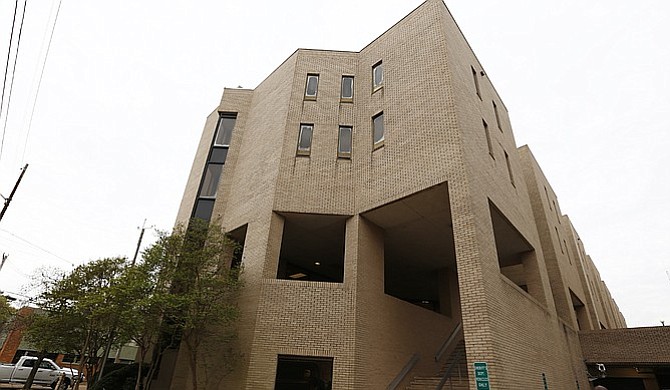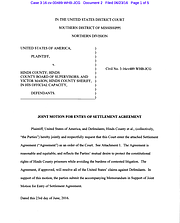Both the Jackson Detention Center and the Hinds County Adult Detention Center are included in the settlement agreement between the county and the U.S. Justice Department. Photo by Imani Khayyam.
JACKSON — The Justice Department today reached a landmark settlement agreement to reform the criminal justice system in Hinds County, Mississippi. The agreement resolves the department’s findings that the Hinds County Adult Detention Center and the Jackson City Detention Center – which together form the Hinds County Jail – failed to protect prisoners from violence and excessive force and held them past their court-ordered release dates, in violation of the Civil Rights of Institutionalized Persons Act (CRIPA).
The settlement agreement is the first of its kind to incorporate broader criminal justice system reform through diversion at the front end and reentry to the community after incarceration. It creates a criminal justice coordinating committee that will help ensure the county’s systems operate effectively and efficiently, develop interventions to divert individuals in appropriate cases from arrest, detention and incarceration, and engage in community outreach. To promote successful reentry, the agreement includes mechanisms for notifying community health providers when a person with serious mental illness is released to help the person transition safely back to the community. The agreement also addresses unlawful enforcement of court-ordered fines and fees by ensuring that the county cannot incarcerate an individual for non-payment if the court does not first assess whether the individual is indigent.
“Across the board, this settlement will make the Hinds County criminal justice system smarter and fairer,” said Principal Deputy Assistant Attorney General Vanita Gupta, head of the Justice Department’s Civil Rights Division. “If implemented, these reforms will make pretrial detainees, prisoners, corrections staff and the entire community safer, while also ensuring that vulnerable individuals get access to the treatment, care and community services they need and deserve. We commend the county for its commitment to making these reforms a reality.”
“For too long, the conditions in the Jail have posed a serious challenge to law enforcement and the safety of our community,” said U.S. Attorney Gregory K. Davis of the Southern District of Mississippi. “I appreciate the commitment made by Hinds County officials to turn the page and begin making necessary reforms.”
The settlement agreement – subject to approval by the U.S. District Court of the Southern District of Mississippi – requires the county to implement a series of reforms across various stages of the criminal justice system, including the following:
·Improve safety and security within the jail through better staffing and supervision, revised policies and physical plant improvements;
·Limit the use of segregation and improve access to screening, treatment and community-based services for special needs prisoners, including juveniles and prisoners with serious mental illness;
·Improve mental health and youth services, including better integration of jail operations with local community mental health and youth programs;
·Enhance communication and coordination among different agencies involved with the criminal justice process; and
·Ensure compliance with due process liberty protections as prisoners navigate the criminal justice system.
Together these reforms aim to improve communication and coordination among criminal justice entities and community service providers to help individuals with mental illness transition back to the community and to reduce recidivism. If approved by the federal district court, an independent monitor will be appointed to assess the county’s compliance.
In May 2015, the Justice Department completed a comprehensive investigation – which included on-site inspections, document reviews and stakeholder interviews by department experts and staff – and issued a findings letter that determined that Hinds County Adult Detention Center and the Jackson City Detention Center violated CRIPA by failing to protect prisoners from violence by other prisoners and from improper use of force by staff. The department also found that inadequate staffing and training, a backlog in record filing and a lack of centralized information resulted in prisoners being held beyond court-ordered release dates.
CRIPA authorizes the department to seek a remedy for a pattern or practice of conduct that violates the constitutional rights of persons confined in a jail, prison or other correctional facility. For more information on the Civil Rights Division’s work in this area, please visit www.justice.gov/crt.




Comments
Use the comment form below to begin a discussion about this content.
comments powered by Disqus